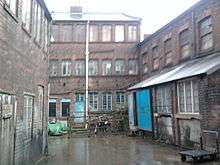Portland Works

Portland Works is a former cutlery works in the Highfield area of Sheffield in England. Built in 1877, it is now a Grade II* listed building with a wide variety of cultural uses. In early 2013, it was bought by nearly five hundred people, through one of the country's largest community share issues.[1]
History
The building, designed by architect JH Jenkinson was constructed in the late 1870s as a cutlery works. Three two- and three-storey ranges of brick-built workshops, offices and showrooms lie around a courtyard containing an octagonal chimney and some more recent structures. The central part of the rear range of workshops was reduced from three to two stories, following a fire. It was occupied for many years by R. F. Mosley, before being split into separate workshops. When first constructed, it was partially mechanised. When surveyed by English Heritage in 1995, it still retained hand forges and a steam-grinding room.[2]
In 1914, through a collaboration between Harry Brearley, Ernest Stuart and R. F. Mosley at Portland Works, this became the first place in the world to manufacture stainless steel cutlery and this remains, to this day, one of the site's many activities.[3] The city of Sheffield in itself is strongly associated with its steel industry heritage not least in sporting world, with the ice hockey team known as the Sheffield Steelers and one of the local football teams, Sheffield United being nicknamed 'The Blades'. Bramall Lane, Sheffield United's football ground, is within walking distance of Portland Works.
Music and art
Musicians
Portland Works has recently come to be an area associated with the music and art scene. Bands such as Kimmy Yeah, Dosch and Big Eyes Family Players use Portland Works to practise, and there are studio facilities for use by other bands.
Artists
As well as musicians, a number of artists make use of the space at Portland Works, including Clare Hughes, Mary Sewell and Nuala Price. One of the most notable pieces of artwork created by any of the artists in Portland Works is that depicting the ghost of Portland Works (a painting by Mary Sewell).
Campaign

Portland Works is one of very few Sheffield metal trades buildings to have a continuous history of manufacturing since its construction, in 1877. For many years it was the home of R. F. Mosley's cutlery business. In 2009, a planning application was submitted for Portland Works to be converted into residential flats. As a result of this, concerned tenants and supporters set up a campaign to save Portland Works site and offer an alternative future based on the existing mix of tenants. The Portland Works website outlines the campaign, through which almost £500,000 was eventually raised to buy the works outright in early 2013. The building is now community owned and operated by approximately 470 shareholders through one of the largest community benefit societies in the UK.
"Robert Fead Mosley" by Anna de Lange (published 2013) outlines the history of the works. Available from Portland Works by mail order at £4.
References
- ↑ Connelly, Stephen. "Portland Works: Community Shares in action June 3, 2013". Centre for Local Economic Strategies. Retrieved 11 February 2014.
- ↑ Historic England. "Portland Works (1271036)". National Heritage List for England. Retrieved 11 December 2014.
- ↑ "Portland Works: About Us". Portland Works. Retrieved 13 March 2011.
Coordinates: 53°22′12″N 1°28′27″W / 53.36996°N 1.47410°W